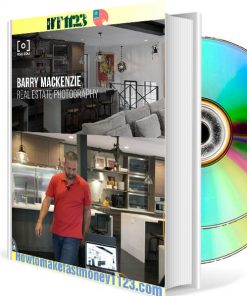Real Estate Cash Flow System – Monica Main
$397.00 $29.00
PROMOTION:
- Buy 2 courses at once will get 3 courses from the store!
Real Estate Cash Flow System – Monica Main Download
SALE PAGE: http://www.monicamain.com/real_estate_cash_flow_system1
This course will help you start making money with Real Estate from scratch and then you will learn how to set up this business on Autopilot.
Starting Over from Scratch
I have a question of recent months that tends to be asked over and over again…yet it was a question that was NEVER asked me in the years prior ever since I started teaching people the methodologies of investing: “If you were to start over right now, today, what would you do step-by-step?”
Interesting question, isn’t it?
My answer today is different than it would have been last year, two years ago and especially 5 years ago.
Since many of my students have asked me what I would do if I had to start from scratch with nothing left to my name, I’ve really pondered on my true answer as it relates to today’s times or the “New Economy” as someone coined the term. I’ve thought about the question in depth quite a few times and my answer has changed each time I’ve thought about it. In fact, I know my answer today is different than my answer would have been even 6 months ago.
Why does my answer keep morphing into something else? Mostly because the real estate market has changed as our national and global economic conditions are being altered almost daily. My answer would probably change again 6 months from now depending on how things change with the economy.
Anyone with a lot of experience in any profession can always sit back and think… “If only I knew [INSERT SOMETHING HERE] when I first got started. If I did, everything would be different now. ”
Unfortunately, it’s not quite possible to know everything when you get started and if you waited around until you did, you would never get started. Even I don’t know everything about real estate investing and if I waited until I knew it all, I would still be waiting to kick off my investing activities.
The other caveat is that most of what you learn in this business has to be discovered in the course of doing the business. There is no way around it. You can’t gain the confidence in how to tell a snotty real estate agent to shove it up his ass if you’ve never done it before.
You can’t tell if a seller is lying to you unless you’ve financially analyzed a number of identical properties over several months or years. You can’t distinguish “test” questions from regular conversation by a lender unless you’ve dealt with this before. You’ll never know what to expect in rehabbing a property unless you’ve walked the steps in the process.
And you’ll never know how to manage a building, evict a troublesome tenant, deal with a crack head squatting on your property, handle an employee embezzling or get rid of someone growing pot plants for profit in your building unless you go through it firsthand yourself.
Obviously my point is: you learn by doing. Nothing else can replace that.
But If I Had to Start All Over Again from Scratch…?
This is an interesting question because I have to do some soul- searching to find my answer.
Right off the bat, here are some topics that I wish I knew more about back in the day when I first got started and definitely things I’d fully utilize my knowledge of now if I had to start over again:
1. Using Business Cash Flow as Leverage
One of the biggest things I wish I knew was about taking an aggressive income cash flowing business and funneling the money into small real estate acquisitions like single-family residences (SFRs), duplexes, triplexes, and “quads.” I wish I understood the importance of having a separate business or means of cash flow to use as a springboard for all-cash real estate acquisitions or at least having some “skin” in the game to show my seriousness as an investor as well as giving myself a much better opportunity in qualifying for mortgages.
2. Tax Tricks
I wish I understood how a 1031 Exchange worked early on before I got hit with so many capital gains taxes that virtually wiped out all of my earnings in my initial investing/flipping years. I wish I understood how easy it was (and still is) to “swap” those profits into a major tax break simply by “trading up” to a property of a higher value.
I also wish I understood the power of depreciation a little better so I could have used it to maximize my tax benefits/breaks. For example, sometimes it’s much better to do a bunch of smaller repairs that you can write off in their entirety for that tax year rather than getting screwed on a long-term tax break “benefit” of years of depreciating a single larger-cost repair (which is known as a “capital improvement”). Sometimes it’s best to repair less than half of a roof during this tax year and the rest the next year so you can take the entire write-off on the repair now rather being stuck in depreciation hell by having to take it as a capital improvement instead.
3. Working with Attorneys
I generally don’t like attorneys but I’ve met a couple who have proven to be highly useful in saving my hide. If you think you’ll be saving money by not getting an attorney, the financial devastation of missing a single line in a contract or a misuse of a single word can mean the different between gaining and losing millions of dollars. Next time you belly-ache about paying $500 or more for some alterations in a draft contract, think about how much could be lost and ask yourself if you’re willing to lose it by being penny wise but pound foolish.
4. Avoiding Partnerships
My biggest lesson which, unfortunately, is somewhat opposite of what I’ve been showing my students which is to try to do your deals yourself without a partner. The majority of my deals I’ve done were screw-jobs with my investor partners or general partners. I attribute this to a couple of things which are (1)1 have a short fuse that only grows shorter by the month and I tend to fly off the handle quickly when things aren’t going right, and (2) I probably (by way of some weird karma) got the sh** end of the stick when it came to having the wrong types of people come into my life.
Getting involved in investor partnerships or setting up equity partners for your deals can still be a powerful way of launching into the business of real estate investing. Part of the reason why I’m still in the teaching/training game is to show people how to not get screwed over like I have in the past. Each deal I’ve gotten screwed in could have easily been prevented even with a single line in a contract every single time.
Unfortunately for me, my days of taking a money person in an equity partnership position are over. I’ve been burned too many times that the only thing I do now are very rare partnerships where I basically control most everything and when I am a liaison between my students and long-standing investor contacts whereas I bridge the two together and everyone involved is essentially on their own from then on.
My position now is that I’d rather do a small deal by myself than a massively huge (and lucrative) deal with one or more equity partners. If only I knew this small “thing” years ago, I would have retained millions of dollars in real estate and equity that’s been since lost due to disagreements, legal loopholes, and downright old-fashioned greed.
5. Finding a Buyer’s Agent
This is a fairly new one and my strategies have changed about 2 years ago on this requirement. I’ve noticed that it’s getting more and more difficult to navigate the world of commercial real estate without your own “representation,” so to speak. It’s almost like trying to launch an acting career in Hollywood without an agent. Not gonna happen! The same goes for commercial real estate in some respects.
Back in the “old days” (like last year, for instance), a listing agent on a property listing would have been glad to get 100% of the commission on the sale of a property deal because there wouldn’t have been a buyer’s agent to share it with. They used to push an offer through to a seller much more quickly while throwing other viable offers to the wayside which have attached listing agents because they liked the notion of getting a larger paycheck upon the close of escrow.
Now it’s different.
It’s almost as if a listing agent needs a buyer’s agent to remind him (or her) why they need to look at the offer and to convince them that their client is a legitimate buyer (rather than a tire-kicker). They need a buyer’s agent (representing a buyer like you) to convince the listing agent that you’re the real deal that wants to move forward with the deal.
There have been too many tire-kickers out there lately, cluttering up the “space” of commercial real estate investing, which has ruined it for those of us serious investors who have the credentials, experience, assets, and down payment funds to do a deal.
Yet your average listing (seller’s) agent doesn’t know this. As far as he (or she) is concerned, everyone who calls these days is a broke, inexperienced tire-kicker who just attended an Armando Montelongo seminar last weekend and won’t have the financial ability to follow through with a deal.
And they no longer want to waste their time on dealing with these time-vampires anymore. (Who could blame them?)
Having a buyer’s agent changes all of this. They become your representation, so to speak. They essentially say, “Yea/?, this guy (or gal) is a legitimate buyer and you really need to take a look at this kick-ass offer I just emailed you. ”
6. Management Secrets
I could write 5 books on the topic of management alone. The short and sweet version would be that I wish I would have known not to let a management company control any asset I have and that all properties have to have my own management strategy in place. Most of my students know how I feel about using a management company yet the very next thing they ask me is how to pick a management company.
Huh?
If you clearly know I don’t believe in management companies then why ask me about how to find one?
It’s like asking me how to pick out the best steak at a supermarket meat counter when I’m actually a vegetarian. I can’t do it and I won’t do it. (Actually, I’m a “pescatarian” which means I eat fish once in a while but…you get the picture.)
I’m a control freak by nature yet I’ll never micromanage anything. It seems to be a bit of an oxymoron but it’s not. I refuse to ever lose control of the money and that’s precisely what happens when a management company becomes involved.
How difficult do you think it is to create your own management company or system? Why pay a “manager” 10% of your gross operating income (GOI) religiously regardless of whether any maintenance or leasing took place? Why would you ever think that your management company would put your building’s priorities with maintenance or leasing when they have so many others to take care of? Why risk them embezzling from your asset by billing for “service calls” that never took place?
I always tell my students, “If you want to hand your asset over to someone else to control, get into a different business because this is not the one for you.”
Just like there is no such thing as the off-site armchair millionaire business owner who sits at home all day while a staff efficiently manages a company, there is no such thing as an armchair real estate investor who doesn’t oversee his (or her) operations. Well, there is. They are just the ones that end up losing their asses in the process.
And you will be learn all the content here:

Be the first to review “Real Estate Cash Flow System – Monica Main” Cancel reply
Related products
REAL ESTATE
REAL ESTATE
REAL ESTATE












Reviews
There are no reviews yet.